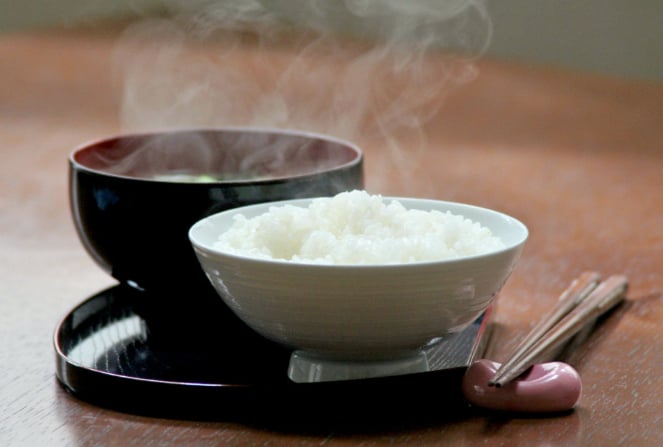November 21, 2025 | 14:41 GMT +7
November 21, 2025 | 14:41 GMT +7
Hotline: 0913.378.918
November 21, 2025 | 14:41 GMT +7
Hotline: 0913.378.918

File photo shows a bowl of steamed rice and miso soup. Kyodo.
The plan to boost exports through improved production is also seen as a way to secure sufficient domestic supply of the Japanese staple to avoid shortages.
In its draft for a medium- to long-term basic plan for agriculture, the government kept intact its goal of raising the country's food self-sufficiency rate to 45 percent on a caloric intake basis by 2030 from 38 percent in fiscal 2022.
The figure refers to the ratio of domestically consumed food supplied by producers in the country.
The draft of the basic plan, revised roughly every five years, highlighted the need to enhance productivity in addition to expanding exports, noting that geopolitical risks and a decline in domestic farmers have destabilized food production and supply in the country.
The government aims to increase the total value of agricultural and food exports from 1.5 trillion yen in 2024 to 5 trillion yen in 2030, while boosting food-related spending by inbound tourists from 1.6 trillion yen to 4.5 trillion yen.
For rice production, the plan presented to the Liberal Democratic Party gathering aims to increase the number of farmers managing fields of 15 hectares or larger and reduce production costs from 11,350 yen to 9,500 yen per 60 kilograms to compete with cheaper imports.
Japan consumes approximately 6.6 million tons of rice a year, meaning the 350,000-ton export target would be equivalent to around half a month's domestic consumption.
While there is currently a domestic rice shortage, long-term demand is expected to decline due to Japan's shrinking population, making expanding exports a key focus.
Previous basic plans have used the food self-sufficiency rate as a key numerical target, but the latest one will feature several goals following the amendment to a related law last May. The government will seek Cabinet approval by the end of the month.
KyodoNews

(VAN) A surge in Ukrainian egg exports, largely driven by soaring sales to the UK over the last few years, has notably pushed up egg prices on the domestic market.

(VAN) The price of Arabica Catimor coffee in Quang Tri is currently at VND 25,000–27,000/kg (fresh cherries), the highest level ever recorded

(VAN) 'From the coffee story, we can think deeper and further about the crop production sector - from development orientations and value-chain organization to international integration,' assessed Dr Le Quoc Doanh.
/2025/11/18/2431-0-161627_248.jpg)
(VAN) Viet Nam accounts for 43% of the world's export volume of Robusta coffee. However, the Vietnamese Robusta coffee brand has yet to gain broad recognition on the global market.
/2025/11/18/5617-2-125215_406.jpg)
(VAN) The consumption demand for premium, healthy, and cold-brew tea products is rising globally, including in the Thai market, opening new opportunities for Viet Nam.

(VAN) The 3F+ model aims for selective resource management, regenerative protection, green education and consumption, all intrinsic to Dabaco’s sustainable development strategy.

(VAN) Carefully packed tea bags, neatly arranged inside containers, begin their 5,000-kilometer journey to Afghanistan, carrying with them the aroma of mountain forests and the pride of Lai Chau province.